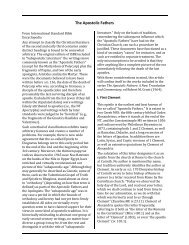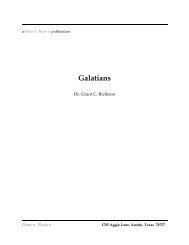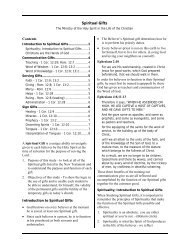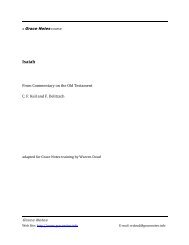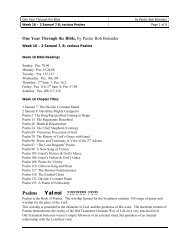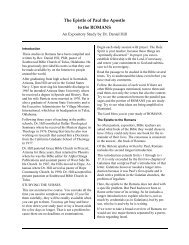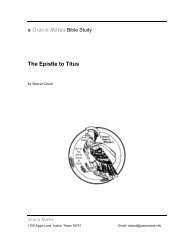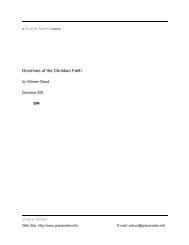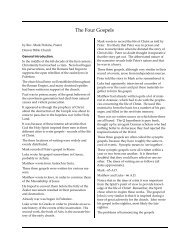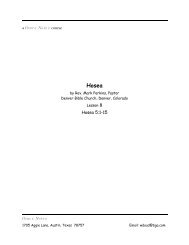Song of Solomon - Grace Notes
Song of Solomon - Grace Notes
Song of Solomon - Grace Notes
Create successful ePaper yourself
Turn your PDF publications into a flip-book with our unique Google optimized e-Paper software.
SONG OF SOLOMON Page 9By C. F. Keil and F. Delitzscha <strong>Grace</strong> <strong>Notes</strong> study‘I was a wall, and have found peace before hiseyes’ (<strong>Song</strong> 8:10).” The same critic also finds inseveral passages an apparent contrarietybetween <strong>Solomon</strong> and the shepherd. “Observe,”says he, “e.g., 1:12, 13, where the shepherd—whom Shulamith calls her spikenard, andcompares to a bunch <strong>of</strong> flowers on her breast—is placed over against the king, who sits on hisdivan; or 7:9f. where, suddenly interrupting theking, she diverts the words which he speaksconcerning herself to her beloved; or 8:7,where, leaning on the arm <strong>of</strong> her beloved, sheexpresses her disregard for riches, with which<strong>Solomon</strong> had sought to purchase her love.” Butspikenard is not the figure <strong>of</strong> the shepherd, notat all the figure <strong>of</strong> a man; and she who ispraised as a “prince’s daughter” (<strong>Song</strong> 7:2)cannot say (<strong>Song</strong> 6:12) that, enticed bycuriosity to see the royal train, she was takenprisoner, and now finds herself, against herwill, among the daughters <strong>of</strong> Jerusalem; and hewhom she addresses (<strong>Song</strong> 8:12) can be noother than he with whom she now finds herselfin her parents’ home. The course <strong>of</strong> theexposition will show that the shepherd who isdistinguished from <strong>Solomon</strong> is nothing elsethan a shadow cast by the person <strong>of</strong> <strong>Solomon</strong>.The <strong>Song</strong> is a dramatic pastoral. The ancientssaw in it a carmen bucolicum mimicum.Laurentius Peträus, in his Heb.-DanishParaphrase (1640), calls it carmen bucolicum,); George Wachter (1722),an “opera divided into scenic parts.” It acquiresthe character <strong>of</strong> a pastoral poem from this, thatShulamith is a shepherdess, that she thinks <strong>of</strong><strong>Solomon</strong> as a shepherd, and that <strong>Solomon</strong>condescends to occupy the sphere <strong>of</strong> life and <strong>of</strong>thought <strong>of</strong> the shepherdess. It is not properlyan idyll, nor yet properly a drama. Not an idyll,because the life-image which such a miniaturedrawn from life—such, e.g., as the Adon. <strong>of</strong>Theocritus presents to us—unfolds itself withina brief time without interruption; in the <strong>Song</strong>,on the other hand, not merely are the placesand persons interchanged, but also the times.The whole, however, does not fall into littledetached pictures; but there runs through thiswreath <strong>of</strong> figures a love-relation, whichembodies itself externally and internally beforeour eyes, and attains the end <strong>of</strong> its desire, andshows itself on the summit <strong>of</strong> this end as onethat is not merely sensuous, but moral. The<strong>Song</strong> is certainly not a theatrical piece: theseparate pieces would necessarily have beenlonger if the poet had had in view the changes<strong>of</strong> theatrical scenery. But at all events thetheatre is not a Semitic institution, but is <strong>of</strong>Indo-Persian Greek origin. Jewish poetryattempted the drama only after it began inAlexandrinism to emulate Greece. Grätz’ (1871)polemic against the dramatists is so farjustified. But yet we see, as in the Book <strong>of</strong> Job,so in the <strong>Song</strong>, the drama in process <strong>of</strong>formation from the lyric and narrative form <strong>of</strong>poetry, as it has developed among the Greeksfrom the lyric, and among the Indians from theepic. In the Book <strong>of</strong> Job the colloquies are allnarrative. In the <strong>Song</strong> this is never the case; forthe one expression, “answered my beloved, andsaid to me” (<strong>Song</strong> 2:10), is not to be comparedwith, “and Job answered and said:” the formerexpression indicates a monologue. And in the“Daughters <strong>of</strong> Jerusalem” (<strong>Song</strong> 1:5, etc.) wehave already something like the chorus <strong>of</strong> theGreek drama. The ancient Greek MSS bearinvoluntary testimony to this dramaticcharacter <strong>of</strong> the <strong>Song</strong>. There are several <strong>of</strong> themwhich prefix to the separate addresses thenames <strong>of</strong> the persons speaking, as ἡ ύ φὴ ὁυ φί ς. And the Aethiopic translation makesfive separate pieces, probably, as the Cod. Sinait.shows, after the example <strong>of</strong> the LXX, whichappear as divisions into Acts.The whole falls into the following six Acts:—(1.) The mutual affection <strong>of</strong> the lovers, 1:2–2:7, with the conclusion, “I adjure you, yedaughters <strong>of</strong> Jerusalem.”(2.) The mutual seeking and finding <strong>of</strong> thelovers, 2:8–3:5, with the conclusion, “Iadjure you, ye daughters <strong>of</strong> Jerusalem.”(3.) The fetching <strong>of</strong> the bride, and themarriage, 3:6–5:1, beginning with, “Who isthis … ?” and ending with, “Drink and bedrunken, beloved.”(4.) Love scorned, but won again, 5:2–6:9.



